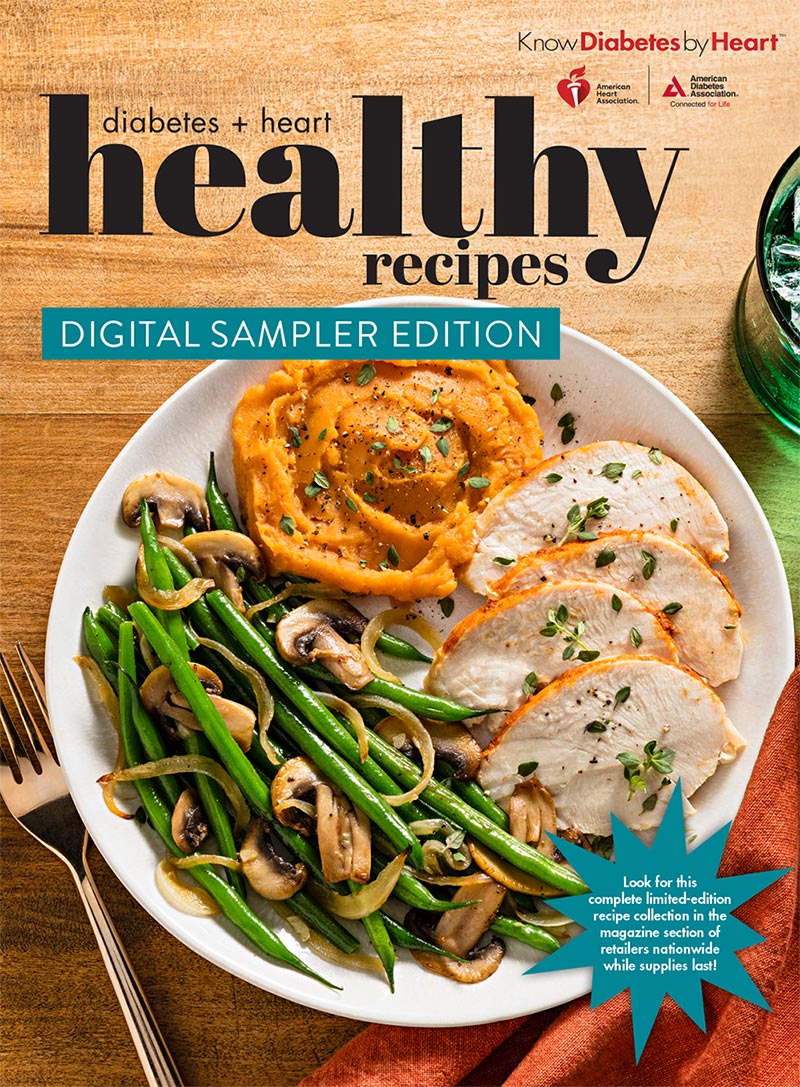Claiming a Type 2 Diabetes Diagnosis
Why Denial Can Make Type 2 Diabetes Worse
The Importance of Kidney Tests in Type 2 Diabetes Management
A Type 2 Diabetes Diagnosis: Nothing to be Ashamed of

Sarah
When Sarah was diagnosed with type 2 diabetes after losing her husband to heart complications from the same condition, she vowed to fight back.
Although many people travel for rest and relaxation, Sarah Bryant prefers a bit more adventure.
During a recent visit to Arizona, she ran a 5K obstacle course, which required her to climb over a wall just to get to the starting line. And while vacationing in Bali, she hiked up the side of a volcano. Both were experiences the Sarah from six years ago wouldn’t have imagined possible.
The excursions were organized by a widow’s group Sarah joined after her husband’s death in 2014.
“It’s helped me to be with people who totally understand what I’m going through,” she said.
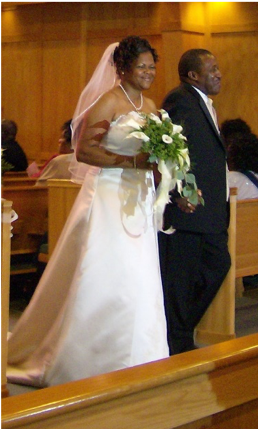
Sarah had only been married three years when her husband had a stroke and became wheelchair bound—a result of his uncontrolled type 2 diabetes. He ultimately passed from heart issues, which is the leading cause of death for people with type 2 diabetes.
Since her mother and brother also had type 2 diabetes, Sarah was intimately familiar with the disease when she was diagnosed in 2019, after suffering severe fatigue that no amount of sleep would alleviate. While the news was like a punch in the gut, she quickly rebounded.
“I knew I was going to beat this,’” she said. “It was time to take action.”
Vowing to change her lifestyle before turning to medication, Sarah enrolled in a diabetes education class, but quickly determined the coordinator’s recommendations didn’t go far enough for her. Sarah did her own research and put together a plan.
After trying a low-carb keto diet, she adopted a whole-food, plant-based, no-oil way of eating that avoids processed foods. She experiments with whole grains like farro and protein-rich legumes, such as mung beans. In place of white sugar, she makes her own date paste from scratch.
“She’s a walking billboard of what you can do if you put your mind to it,” co-worker and close friend, Janell Bannister, said. “She shares her knowledge, and I love that about her.”
Exercise also plays a key role. Sarah had already begun strength training with a group, and she became even more focused after her type 2 diabetes diagnosis, walking two to three miles on her non-gym days and boxing on a heavy bag. When the weather doesn’t cooperate, she hops on her treadmill, which has several different programs to keep things interesting. And she jumps on a mini trampoline every morning.
“It gets everything moving and helps you start the day,” she said. “I created a lifestyle for myself that I really enjoy.”
The changes paid off. In the past, Sarah struggled with her weight, gaining and losing the same ten pounds in a seemingly never-ending cycle. Since changing her lifestyle, however, she has lost and kept off 50 pounds in less than a year. As a result, she’s the smallest she’s ever been—and she feels better than ever, too.
Sarah’s blood glucose improved almost immediately, eliminating the need for medication. And her acid reflux, which caused a severe burning sensation in her chest and throat cleared up.
“I feel good when I wake up in the mornings, I don’t get fatigued throughout the day and I seem to have a lot more energy,” she said. “I didn’t realize that I wasn’t feeling great until I started feeling great.”
According to Sarah, her biggest teacher has been her late husband, Joseph, a stark example of what can happen when people don’t take diabetes seriously. Taking care of him, she said, was hard, and she doesn’t want her family and friends to ever be burdened with caring for her.
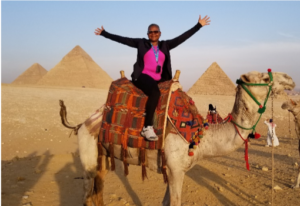
Those long days working full-time, commuting an hour and a half each way, and caring for her husband were the hardest days of her life, she says. To motivate herself then and now, she references her favorite quote: You never know how strong you are until being strong is the only choice you have.
As for her health progress, Sarah says she’s amazed at herself and proud for sticking with it.
“Diet and exercise are the greatest weapons you have to fight diabetes and there’s a whole arsenal out there.”
While the COVID-19 pandemic quashed Sarah’s plans to visit South Africa this year, she’s making plans to visit Senegal, Africa in 2021.
“We have a habit of putting limits on ourselves,” she said. “We need to push beyond them.”
Lupe

Lupe has overcome uncertainty with restored confidence, removing barriers that kept her from managing her type 2 diabetes to claim her second chance at the life of her dreams.
A self-described “weirdo” who loves analyzing datasets and solving mind-bending puzzles, Lupe Barraza wears many hats. She’s a busy CPA for a large health care organization, a PhD student and a mother of six children, three of whom are still at home.
She’s also an avid runner, jogging 100 miles per month for health, fitness and stress relief.
“It makes me feel good and keeps me sane,” she said. “I’ve been down quite a road, and this is my time.”
Fitness hasn’t always been her story, but it’s a major key to her comeback.
We teamed up with Inside Edition to share Lupe’s story.
#Type2Take2 #sponsored
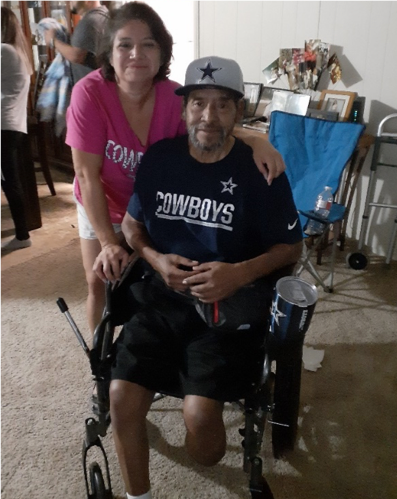
First married at 18, Lupe went on to have four children in quick succession. Slowly her weight crept up and her doctor told her she had prediabetes. It was tough to hear, but not a surprise. Her father and all but one of his 12 siblings had battled diabetes and suffered amputations, strokes, heart disease and chronic kidney disease as a result.
“He’s one of two survivors,” Lupe said. “I’ve seen so many of my aunts and uncles go in for amputations and it shocks their system so much that they don’t make it.”
In an effort to get healthy, Lupe started running, which helped get her numbers under control. She ran 10 marathons and two ultramarathons. At the same time, she transitioned from a stay-at-home mom to a full-time college student, earning both bachelor’s and master’s degrees—and passing the CPA—in three years.
In the process, Lupe’s marriage fell apart, and the couple divorced. Less than a year later, she married a childhood friend.
“Talk about rebound,” she said. “That relationship catapulted me into being the sickest I’ve ever been.”
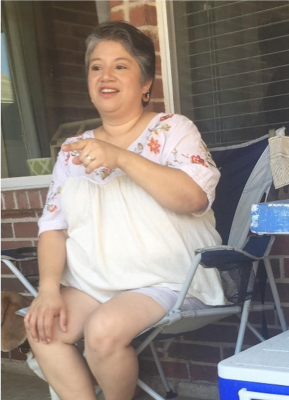
Within months, Lupe realized her new husband struggled with substance abuse, and he had trouble holding a job. Always trying to keep the peace, she stopped running, neglected her diet, gained almost 80 pounds and developed type 2 diabetes. When she ate healthy foods, he mocked her and tried to make her feel guilty.
“I had to eat what he made me,” she said. “If I tried to follow a diet, that was insulting to him.”
Lupe asked her husband to leave on more than one occasion, but he refused. One weekend, he hit her and spent several months in jail. It was about that time when Lupe’s hands and feet began tingling, often painfully enough to wake her up in the middle of the night—a result of nerve damage from high blood glucose. It hurt so bad she couldn’t squeeze her hands.
“I was not well at all,” Lupe said. “But I didn’t know how to fix it. I had isolated myself from my family and friends and was very alone.”
More than the unhealthy eating habits and lack of exercise, Lupe said, stress played a huge part in her uncontrolled diabetes.
“Why wasn’t I taking care of myself” she asked. “In my culture, you don’t give up your husband. You shut up and be a good wife, and that’s what I did. But by doing that, I was killing myself.”
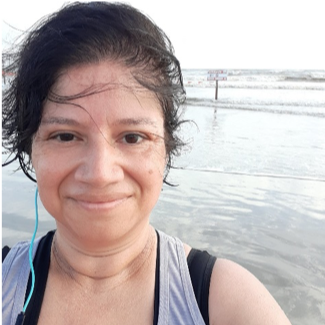
Ultimately, Lupe filed for divorce. On her own for the first time and determined to get healthy, Lupe worked with Dr. Naureen Agha, an American College of Physicians fellow, to formulate a plan. Medication keeps her blood sugar and high blood pressure under control. And she has recommitted to a healthier diet, opting for low-cab, low-fat meals like grilled chicken with chickpea pasta instead of fast food. And—perhaps most therapeutic—she picked back up her running shoes.
The changes have paid off: She’s down 55 pounds, and her A1C has gone from 11.5 to 5.4.
“Lupe does the work and has completely changed her life – one little bit at a time,” Agha said, describing her as one of her favorite patients. “She’s only on one medicine for diabetes now and it’s half the dose it was before.”
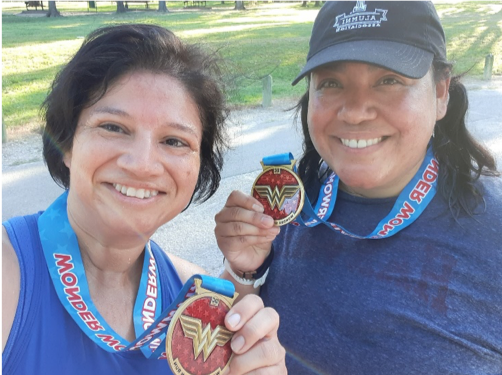
“Managing diabetes and heart health isn’t always as simple as eating better or exercising more. Oftentimes, we have to take a step back and ask ourselves what’s keeping us sick,” Lupe said.
Now, Lupe hits the streets nearly every morning and takes a longer run on the weekend preparing for her “comeback marathon”.
“I’m making my way back and just feeling good about myself again. I have control over my choices and I’m choosing to take care of me,” she said.
Karen

Karen knew she could thrive with type 2 diabetes if she managed it well. Then circumstances interfered with her medication plan and she suffered a stroke.
Karen Dawson has played several roles on television, film and stage roles during her career.
Acting work is famously unsteady though, so she also worked in the health care industry, first as a radiological technologist and more recently, as a phlebotomist.
Being in the health care field—and having a family history of type 2 diabetes and heart disease—Karen, was familiar with the condition when she was diagnosed in her 40s after experiencing intense stress and grief over her mother’s battle with lung cancer.
“I took care of her until she crossed over, and then everything hit me,” she said.
When Karen was diagnosed with type 2 diabetes, she knew as long as she managed it well she could live a long, otherwise healthy life.
“Once you understand the disease and what it takes to live with it, it’s not that scary,” she said.
Following her diagnosis, Karen started daily walks and cut back on sugary desserts. She also took medicine to help manage her blood glucose and high blood pressure.
But in 2019, Karen’s work hours were cut and she lost her health insurance, car and apartment. As a result, she couldn’t afford her medication. She stopped taking her pills and the consequences were severe.
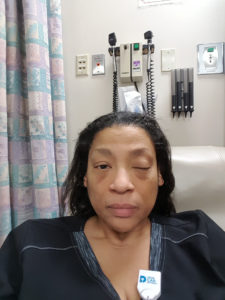
One night, Karen developed a severe migraine headache. When she woke up the next morning she couldn’t open her left eye. She drove herself to the hospital where she worked, but instead of starting her shift, she walked into the emergency room. After a full examination, the neurology team told her she’d had a stroke.
“I was emotionally numb,” she said. “I knew better and I never thought I’d be in this position. It was hard to accept.”
A few weeks later, an EKG showed evidence of a past heart attack. Unable to access rehabilitation therapy, she sought advice from a friend, fellow actor and home health care nurse, Carla Valentine, who suggested Karen change things up, for example, by using her left hand instead of her right to brush her teeth, or by taking a different route to the grocery store.
“It’s a way to stimulate your brain,” Valentine explained. “It’s good for anyone, especially somebody who’s had a stroke.”
“In my opinion, it worked,” Karen said.
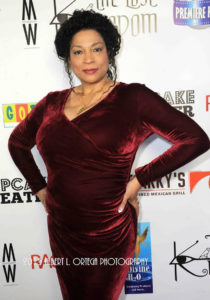
Since her stroke, Karen has doubled down on her already healthy diet, cutting out red meat entirely, loading up on vegetables and replacing white rice with brown in her stir fries. And she stays fit by swimming in the community pool at her new apartment complex.
Most importantly, she began working a full-time job with health benefits, enabling her to fill her prescriptions, which she never misses.
Sometimes, she admits, the events of the past few years weigh on her.
“It can be difficult, but I keep a positive attitude and put one foot in front of the other,” she said.
Much to her agent’s delight, Karen recently started auditioning again. Because of the COVID-19 pandemic, the process is done remotely, and she usually recruits a neighbor to read for the other role. It’s not quite the same rush as doing it in person, but Karen is nothing if not flexible—and determined.
“Acting has always been my passion and I have always pursued it to the fullest,” she said. “God willing, it will take off this time.”
Jane
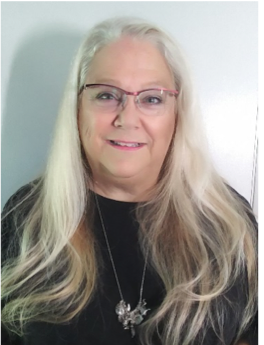
Refusing to surrender to a trio of potentially debilitating chronic conditions, Jane surrounded herself with experts—then became a patient advocate to help people like her.
Jane DeMeis has never sat still in her life. In fact, her husband, Joe, calls her “the white tornado” because of her high energy and her platinum blond hair.
For years, Jane worked long hours as the director of education for a home healthcare agency, often heading into the office before sunrise, burning the midnight oil and taking on additional responsibilities when required. Now in her 60s and enjoying retirement in the charming village of Fairport, New York, she’s somehow even busier.
Jane serves as the chair of the board for the local ambulance company, the director of communications for the historical society, liaison for people in need to the local food shelter and a trustee on her village’s tree board – just a few of her many endeavors.
Her energy is even more remarkable in light of her medical history.
In 2003, Jane was diagnosed with Factor V Leiden, an inherited condition that causes blood to clot. And several years later, she learned she had psoriatic arthritis, an autoimmune disorder that attacks healthy tissue, causing joint inflammation. It made it difficult to walk and her fingers curled up and become claw-like. “I went from playing tennis three times a week to not being able to hold a pen,” she said.
A common blood thinner helped to minimize the risk of clots. She was prescribed a treatment of prednisone and methotrexate — a chemotherapy and immune suppressant — and ibuprofen to treat the arthritis. After several months on the regiment, however, Jane started urinating blood, and her kidneys were damaged. Through the next years, the psoriatic arthritis changed her blood chemistry, causing her to pass more than 30 uric stones. Doctors diagnosed her with stage 3b kidney disease.
“I felt very alone,” she said. Then, on top of everything, in 2016, a routine blood test revealed she had type 2 diabetes.
“Most people would curl up in a little ball, but not her,” said her husband, Joe, who also lives with type 2 diabetes and has heart issues. “Jane’s a fighter.”
In 2017, Jane’s kidney function declined further and she went to stage 4 CKD. Determined to get her numbers under control, Jane met with a renal dietician, who helped her to create a way of eating suitable for both kidney disease and diabetes. It’s a tricky balance. A renal diet is low in sodium, protein, potassium and phosphorous, while a diabetic diet restricts primarily fats and carbs. And because she has Factor V Leiden, she needs to carefully monitor her intake of Vitamin K, a nutrient involved in blood clotting that’s found in dark green foods.

While she enjoys some dairy products and eats poultry once-in-a-while, Jane has adapted a largely plant-based diet. Rather than get frustrated at all the restrictions, she took it as a challenge. She learned to bake her own whole wheat, rye and Italian bread, which doesn’t raise her glucose as much as store-bought loaves. She modifies recipes with a variety of fresh herbs and seasonings.
“A small cup of mashed potatoes has your daily allotment of carbs, but if you use cauliflower instead, you can eat a lot more of it,” she said. “Of all the things I have to deal with, diabetes is the thing I have the most control over.”
In addition to tending to her large herb and vegetable garden, Jane also started a walking program, strolling for about a mile at a time at a local nature preserve or along the shore of Lake Ontario. With the modifications of her diet, she has lowered her A1C to 5.9 and lost nearly 40 pounds. She also was able to stabilize her renal function for more than three years.
Proud of her accomplishments and duty-bound to pay it forward, Jane has also begun volunteering to a variety of causes dedicated to helping others. For example, she helped develop menus for cooking classes for people with kidney disease. And she’s part of a community outreach program that educates people about topics like kidney disease, blood pressure and heart disease.
Perhaps most rewarding, she serves as a peer mentor and ambassador for the National Kidney Foundation, talking with people newly diagnosed with kidney disease.
“Health care providers have a tendency to give you the bleak side of things, and that can be frightening and overwhelming,” she said. “That’s not the way it has to be. No one has to do it alone.”
Annette
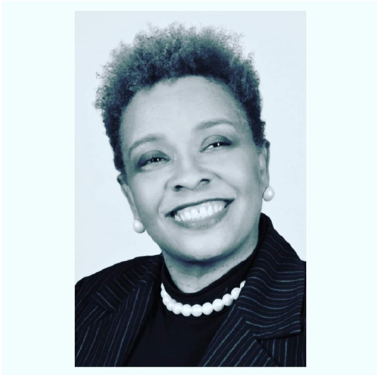
An injury to Annette’s eye and her father’s sudden death from a heart attack prompted her to get serious about controlling her type 2 diabetes.
Annette’s life changed dramatically one day over 30 years ago, after her car was T-boned by another vehicle that plowed through a red light.
Thankfully Annette—who was 6 months pregnant at the time—escaped without serious injuries. But the doctor treating her told Annette that she had gestational diabetes.
Gestational diabetes increases the risk of high blood pressure, preeclampsia and c-section during pregnancy. It also increases risk for type 2 diabetes, which can begin immediately following birth or develop later in life. Annette, like her mother and siblings, developed the condition and now lives with type 2 diabetes.
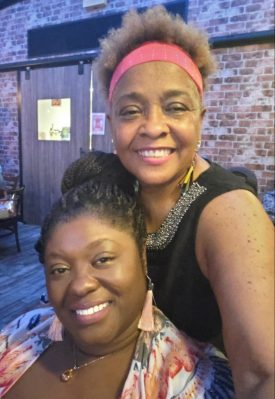
For the years that followed, Annette focused on raising her family and her career.
Starting as a government case worker at Mercer County Board of Social Services, Annette moved up through the ranks. She eventually took an executive position overseeing support services for the 500-person agency.
Although she excelled at work, Annette had trouble getting a handle on her health, over-indulging in high-calorie foods and not getting enough exercise.
Even so, she never missed a doctor’s appointment, fighting fear and embarrassment to face the proverbial music, even when she knew her blood sugar was too high.
The periods of elevated blood sugar left their mark. A few years ago, Annette accidentally fell and hit her eye on the edge of her desk at work. A full examination found that diabetes had damaged her retinas in both eyes. With the help of a skilled surgeon and multiple laser surgeries, her sight was preserved but she has limited vision in her left eye.
“I could have gone blind,” she said.
Shaken by her vision and her father’s sudden death from a heart attack, Annette was ready to get healthy. She found a new doctor who understood her experience as an African American woman and gave her culturally relevant health advice. She also began working with a therapist and diabetic coach Nabiliah Ismail.
She increased her water intake and substituted fruit for chocolate and other sugary treats. She ultimately embraced a plant-based diet. And to get fit, she embarked on an intensive four-day per week exercise program that includes long walks, Yoga, Tai chi, pool aquatics and strength training.
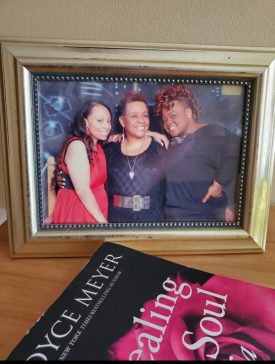
The changes have made a huge difference in her health and well-being, boosting her energy and, with the help of insulin and medication, lowering her blood sugar, blood pressure and cholesterol.
“Annette is very vibrant, and she has a wonderful outlook in life,” Ismail said. “This chapter in life may be one of her best.”
“My health journey has been a long one. A difficult one. But here’s what I know for sure today: denying diabetes doesn’t make it go away and you’re never too old or too sick to make a change for your heart health and your diabetes,” she said.
Annette’s family and friends had difficulty adjusting to her new lifestyle, but they’ve come around. When she gets together for an evening out with her Alpha Kappa Alpha sorority sisters, for example, she drinks water and orders the lowest carbohydrate meal possible, like a salad and a vegetable side.
“I’m sorry that it took me so long to get where I am, but I got here. And even the small changes I’m making after 55 have helped make the difference,” she said.
Annette says that although she’s been surrounded by diabetes her entire life and seen her loved ones suffer from it, it wasn’t easy to own it.
“Diabetes can be frightening. But what I can tell you is that educating yourself and finding help to get to the other side of that fear is a whole lot better than living in it.”




